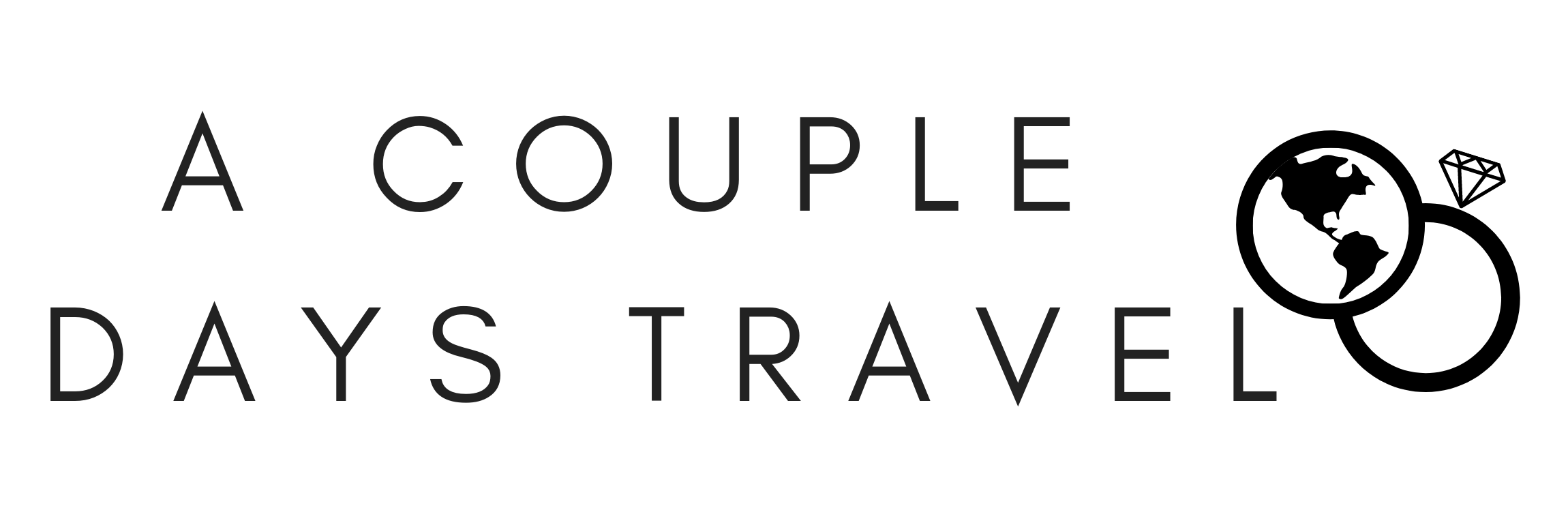Have you ever wanted to travel to another world? While becoming an astronaut may not be an option for all of us, scuba diving is. Floating weightlessly under water among foreign plant and animal life is so alien it can only be described as otherworldly. Adding scuba diving to your skill set will allow you to see underwater worlds as you travel the world with your PADI Open Water Certification. Continue reading to discover the paths you can take and how to get scuba certified.
How to Get PADI Scuba CertifiedToggle Table of ContentToggle
Why Should You Get Scuba Certified?
Scuba diving is, most generally, swimming underwater with a Self Contained Underwater Breathing Apparatus (SCUBA). This tank of breathable air allows you to explore underwater at depths that you would be unable to reach with snorkel or swimming gear. If you are a lover of animal life, the water or adventure activities you will love scuba diving. There is no other activity that scuba diving compares too. The closest thing we can relate it to is traveling to another planet.
If we’ve convinced you to try scuba diving, we think that you should work to gain your certification. No respectable dive shop will allow you to dive on your own (or in some cases dive at all) without proper dive certification. Occasionally, resorts will allow you to dive without certification with a guide but restrictions on this type of diving can be limiting. So if you think you’re going to dive more than one time in your life, you may as well start your diving with your certification which will allow you to gain greater freedom in the types of dives available to you.
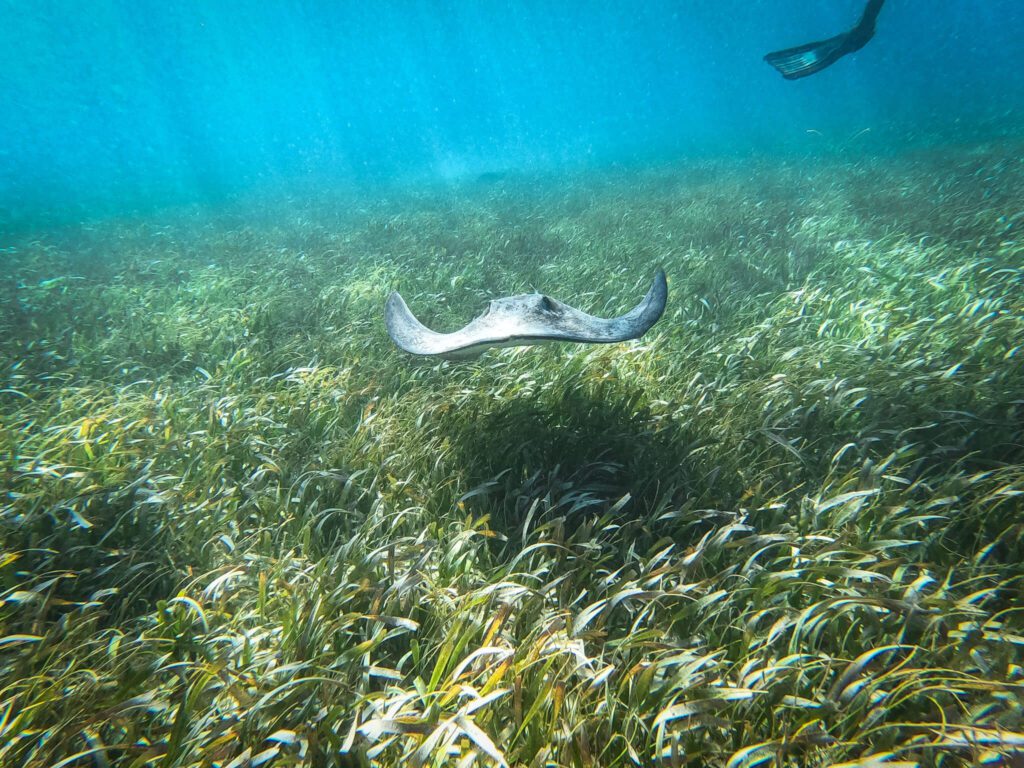
Where to Get Scuba Certified?
There are hundreds of certified diving instructors around the world. There are also several different diving certifications that you can get. The two main agencies to get certification with: PADI and SSI. We’ve found that PADI is more globally recognized and is the type of certification that we have so for the rest of this article, we’ll describe PADI certification.
Once you’ve chosen the agency that you want to get certified in, you’ll need to decide where to take your courses. You can take your courses locally or you can take courses while traveling.
Local Certification
We highly recommend getting certified locally. We think that getting certified locally allows you to get certified in an area that you feel more comfortable with. It also means you won’t be taking up any of your precious vacation time with learning skills and taking tests. We were able to get certified in winter which was a fun cold water activity for us to do. Doing courses locally also allows you to do the coursework (yes – from a book) from the comfort of home at your own schedule. Depending on the instructor you choose, courses can take anywhere from one weekend to several weeks. Our course was scheduled out over three weekends.
On-site Certification
You can also get your certification on location while you’re on vacation. This is a great option for people who don’t have availability in their schedule to take scuba lessons at home or for people who didn’t know they wanted to scuba dive until they are on vacation. Most popular dive sites will have instructors on hand that will allow you to explore a dive site while learning the skills required for your certification. Generally, you’ll start in a pool or a shallow area and learn skills and then do diving with a guide at the dive site. Lots of people get their dive certification this way. However, be aware that if you choose to go this route, you will spend a lot of your vacation time in a classroom or a less exciting dive site than if you had arrived with your certification.
You can also combine these two options if you are getting PADI certified. PADI’s Scuba Diver Course can be done locally. This section of the course is primarily done in the pool and in a classroom. This certification allows you to dive with a guide to a depth of 12m. Once you have your Scuba Diver Certification, you can then get your Open Water Diver Certification on location. Open Water Diver Certification from PADI is considered the standard certification for scuba diving solo around the world and will certify you for depths of up to 18m. This course is completed in open water which makes it ideal for completing on vacation as you’ll be able to learn more advanced skills while still being comfortable in the water.
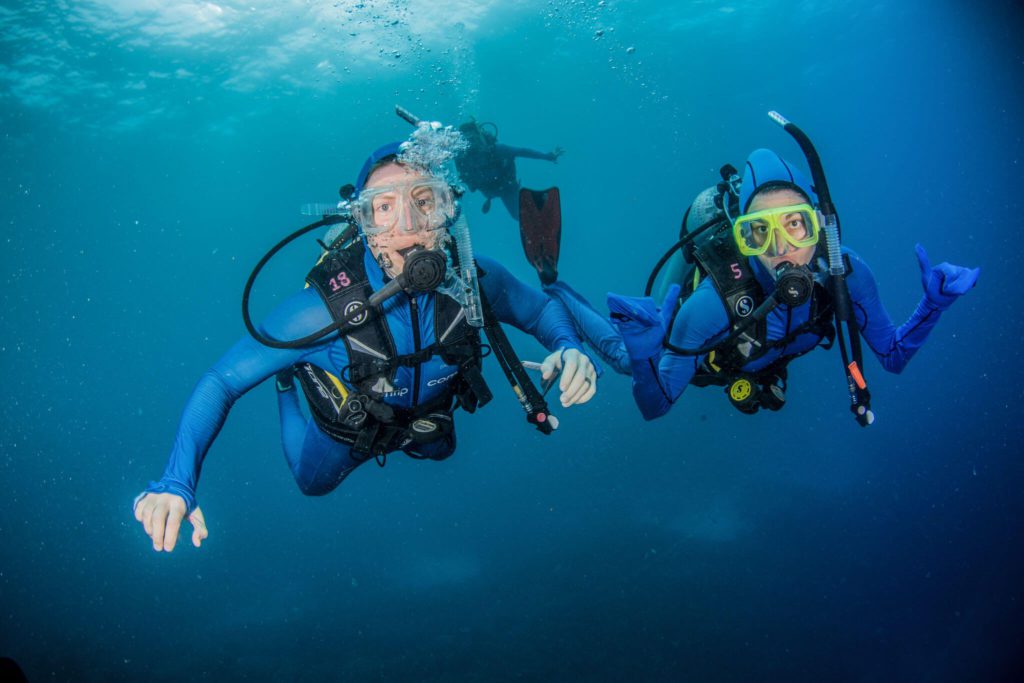
How Much Does Certification Cost?
Certification classes range from $250-500 USD depending on location. You’ll generally pay more for classes when you are on location. You’ll also want to ask if gear is included in your price and factor any rental fees for gear into your total cost.
If you want to buy gear of your own, that can get pricy. However, most courses (and tons of diving tours) include gear for you to use. So I would recommend against buying gear when you’re beginning unless you need some specialized gear, like prescription goggles. If you do need specialized gear, check with your dive instructor to see if they have some that you can use or rent before you invest in gear of your own.
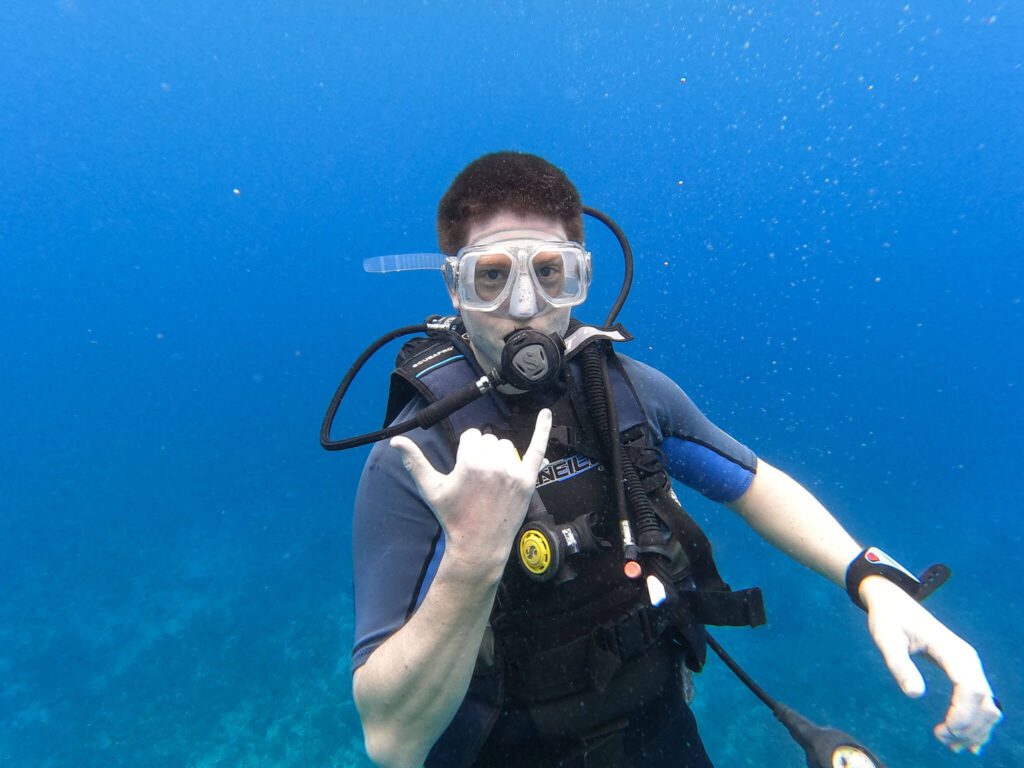
What You’ll Have to do to Get Scuba Certified?
You’ll have to be able to swim. You probably already guessed that but you should be relatively comfortable in water. You’ll be required to swim 200 feet and tread water for 10 minutes before getting started with your scuba skills.
Coursework
You’ll also have to complete coursework, including reading, watching videos and taking tests. We completed all of our reading and videos at home and then were able to review sections with our instructors and ask questions before taking the tests. The skills you’ll learn from the coursework are relatively easy, especially with the help of your instructor and the internet! You’ll also have to take a final exam. If you follow along with the coursework and ask plenty of questions, you should be able to pass the test.
Scuba Diver Skills
Next, you’ll complete the skills needed to get your PADI scuba diver certification in a closed environment like a pool. You’ll learn and practice basic scuba diving skills like putting on gear, entering/exiting the water, sharing air, buoyancy control, using weights, and taking off your mask.
Open Water Diving Skills
Next, you’ll complete four dives to get your PADI open water diver certification. You’ll practice the same skills you learned in the pool at a depth of around 10m in open water.
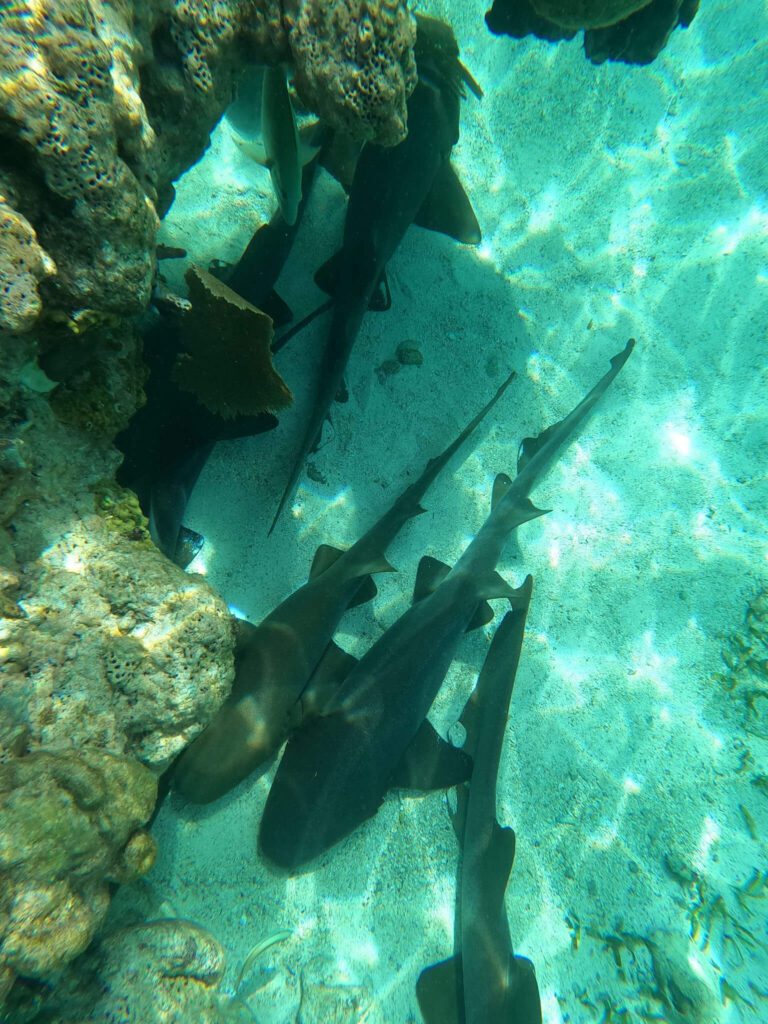
Where Can I Go and When Does it Expire?
Your PADI Certification never expires! However, it is a general rule of thumb that if you haven’t been diving in a year to do a review dive with a guide or skill refresher dive prior to diving again.
PADI (and SSI) diver certifications are generally recognized at dive sites around the world. However, when planning your dive trip, make sure to ask what they require for certification so that you can make sure to bring that with you.
What If I’m Scared?
Admittedly, scuba diving can be terrifying. Paula routinely feels incredibly claustrophobic in the gear when above water. However, if you are properly trained, this activity becomes relatively safe and relaxing. If you think that your fear may impact your ability to scuba dive, we recommend starting your scuba diving courses in a local pool. Starting your diving in a controlled and familiar environment like a pool can help you to try this activity in a less frightening situation.
Also, know that this certification process is repetitive. This is part of the design. After completing your course, your diving skills should come to you like a reflex. So when your husband knocks your regulator (the breathing bit) from your mouth while doing a night dive with sharks, you’ll have no problem getting yourself breathing again and completing the dive like a pro.
If the underwater critters are making you nervous, ask your diving instructor about them. Your dive instructor has likely been diving for a long time. They’ll let you know what to watch out for when you’re diving. And don’t worry, the sharks are more afraid of you than you are of them 🙂
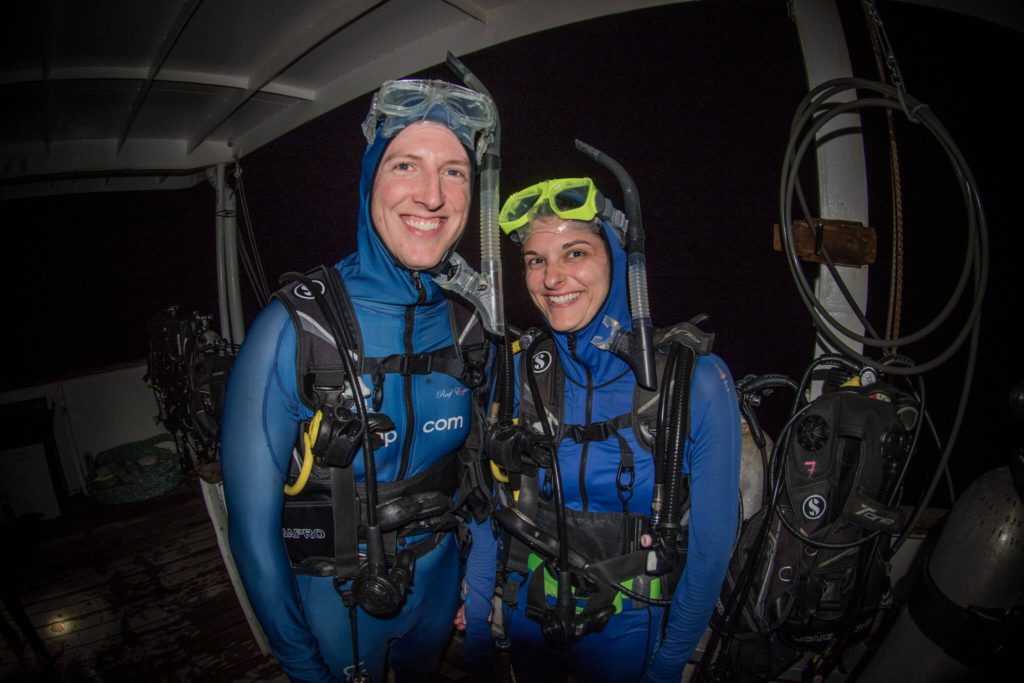
What If I Love it and Want More?
If you complete your initial diving certification and still want more, don’t worry, you can get it. One way to get more dive time is to travel the world and find amazing dive sites. Check out our diving posts for more information.
You can also get additional diving certifications to increase your skill set. Some of the most popular extra certifications are the Advanced Diver, Dry Suit Diver (for cold water), Enriched Air Diver, and Underwater Photographer. Find out more about how to get scuba certified in these courses here.
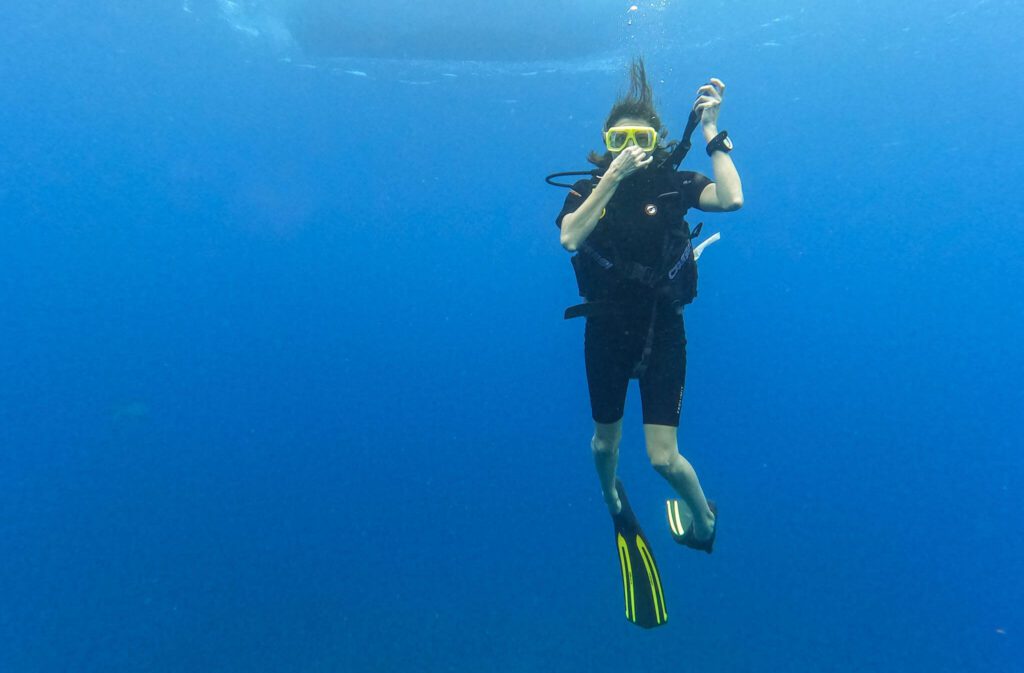
We hope this guide has helped you decide how to get scuba certified. We are so thankful that we were able to get certified. Our PADI certification has allowed us to explore a part of this world that few people get to explore and has given us an amazing hobby to share. Our certification has transformed something that once terrified us into something that feels natural and relaxing. We hope that once you decide how to get scuba certified, your certification will open new worlds to you.
